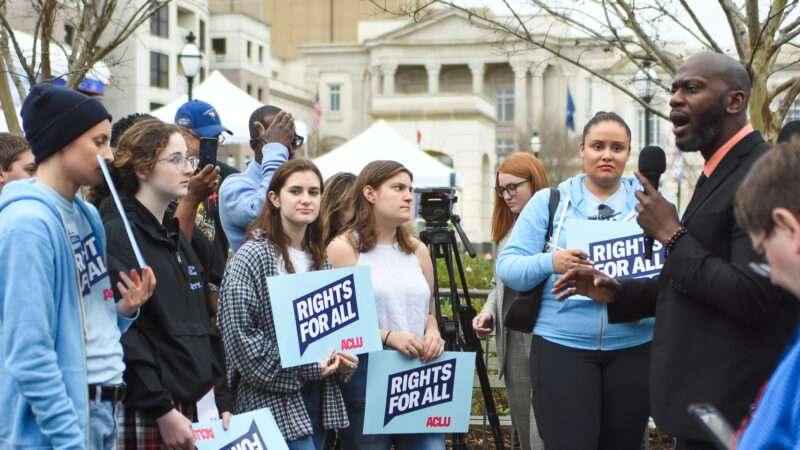
This week, David Cole, the American Civil Liberties Union’s (ACLU) National Legal Director, wrote in The Nation that critics have accused the organization of “no longer defend[ing] those with whom we disagree.” Former supporters have referred to the organization as a “caricature of its former self” that is “leaving the First Amendment behind.” Cole, on the other hand, contends that the organization “continue[s] to believe that the First Amendment is the foundation of our democracy, and we defend it for precisely that reason.” Despite citing plenty of commendable examples, his defense misses the degree to which internal partisan shifts have watered down the ACLU’s mission.
Cole cites, as one historical example, the case of Skokie, Illinois, in which that state’s ACLU chapter defended the rights of neo-Nazis to march through a town that was home to hundreds of Holocaust survivors. This case is cited as a fundamental example of free speech defense, and for good reason: The right to free speech must be defended even in the most heinous of circumstances, for the most heinous of people.
But in August 2017 after the Unite the Right rally in Charlottesville, Virginia, in which a woman was killed and dozens were injured by a white supremacist driving his car into a crowd of counterprotesters, the ACLU signaled a shift in focus. The organization’s Virginia chapter had played a role in helping the rally’s organizers secure a permit after they’d initially been denied.
In the months that followed, Cole chaired an internal ACLU committee that drafted new case selection guidelines for the organization. While the document does reaffirm the organization’s commitment to free speech, it also takes great pains to list ways in which the organization can distance itself from its potential clients’ beliefs, such as by “denouncing the views in press statements, op-eds, social media, and other available fora.” “How, exactly, loudly disavowing their clients is consistent with lawyers’ duty to zealously represent them was not explained,” wrote Lara Bazelon, law professor at the University of San Francisco School of Law, in The Atlantic. “Speaking as a criminal-defense lawyer, I don’t think it can be.”
The new guidelines stated that “the ACLU generally will not represent protesters who
seek to march while armed…whether or not state law permits or prohibits the carrying of weapons in a protest.” Last year, the organization even signed an amicus brief seeking to keep New York’s onerous gun registration laws in place, stating that “restrictions on guns in public spaces are appropriate to make public spaces safe for democratic participation,” officially making the Second Amendment subordinate to the First, in the ACLU’s view.
In the last few years, the organization seems to have drifted into outright partisan political activism: Rather than simply advocating for specific civil liberties–protecting policies or ballot initiatives, in 2018, the ACLU spent $800,000 on a campaign ad for Democrat Stacey Abrams in her run for governor of Georgia. Last year, it petitioned for the government to cancel up to $50,000 in student loan debt per borrower. Regardless of the merit of either position, neither is directly related to the defense of constitutional rights or civil liberties.
Cole’s defense, that the organization retains its single-minded defense of free speech for all, does not adequately recognize that today’s organization is riven by internal struggles over whether free speech is compatible with social justice. Nor does Cole recognize that many of these critiques come from within the ACLU’s tent. The revised case guidelines were originally leaked by Wendy Kaminer, an erstwhile ACLU board member who had grown critical of the organization. Nadine Strossen, a former president, and Ira Glasser, former executive director, each criticized the organization for its post-Charlottesville pivot. And David Goldberger, one of the Jewish attorneys who famously defended the Skokie neo-Nazis, said of the organization today, “I got the sense it was more important for A.C.L.U. staff to identify with clients and progressive causes than to stand on principle.”
In many ways, the ACLU has drifted from its initial mission, as “the nation’s premier defender of the rights enshrined in the U.S. Constitution.” Cole acknowledges that “some on the left are less committed to free speech than they once were.” What he fails to contend with is how that describes the ACLU as well.
The post ACLU Would Like You To Ignore Partisan Activism, Mission Drift appeared first on Reason.com.
from Latest https://ift.tt/6frmpgX
via IFTTT